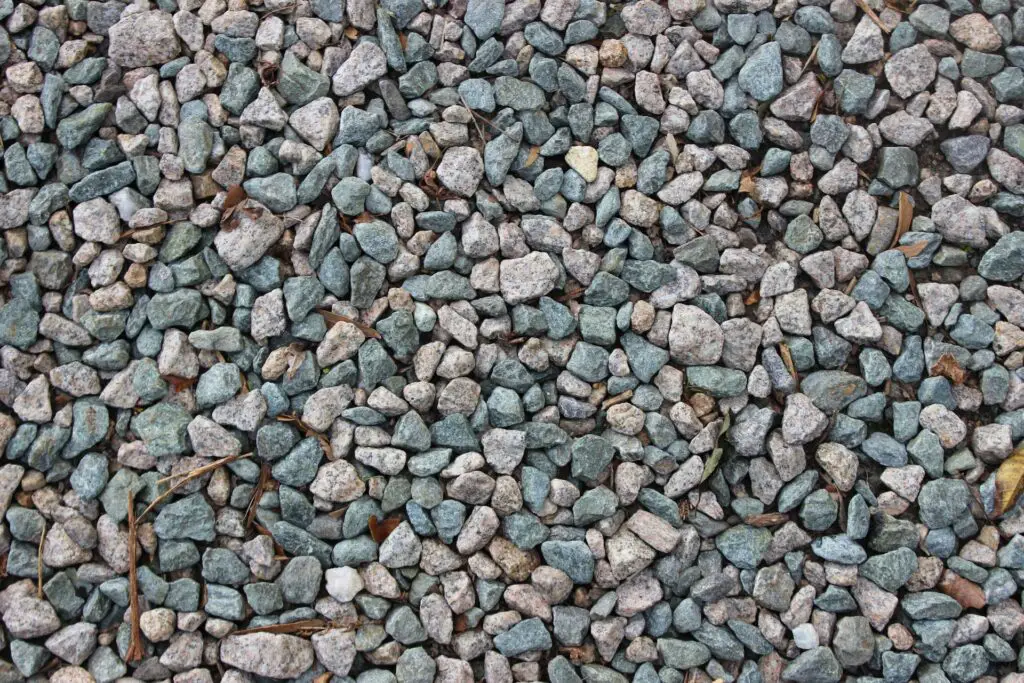Pea gravel is small, rounded gravel that is suitable for use on walkways and driveways. This calculator helps give an estimate of the amount required to complete a project using this material.
To find out how many liters of pea gravel is needed to cover a specific area, follow these steps below:
Read More: What Gravel To Use For Patio Base [Best Options]
Read More: Pea Gravel Patio Pros and Cons

Free Pea Gravel Calculator
Pea gravel is one of many choices when it comes to paving your driveway or walkway. This guide will show you the different options and calculations needed for pea gravel.
1) Measure the width and length of your surface in meters. For example, if the width is 2m and the length is 5m, then your surface would be 10 square meters. Enter those figures here:
2) Find out what size (diameter) you require your pea gravel to be and enter it into the “Size” box below. Generally, we’d recommend 1/4″ (6mm), but 1/8″ (3mm) will also work. Enter the size of your required pea gravel:
3) If you want to know how much 1 cubic meter of material weighs then enter that figure here:
4) Press the calculate button and we’ll tell you how many liters of pea gravel you need:
5) Finally, we’ll give you some price information. We won’t include freight or delivery costs because these vary too much depending on where you live. Instead, we list the cost per unit (i.e., per liter).
Based on the measurements you provide, you can work out the area and volume of the required pea gravel using the formulae detailed below:
Area=Length×Width
Volume=Area×Depth
Weight=Density×Volume
Best of all…
Our calculator can work out the total cost if you know the price per unit mass/volume:
Cost=Priceperunitmass×Weight
Cost=Priceperunitvolume×Volume
What if I don’t know the price per unit mass/volume?
You can work out these values from a bag of your purchased pea gravel, using the formulae:
Priceperunitmass=TotalcostTotalweightPriceperunitmass=TotalcostTotalweight
Priceperunitvolume=TotalcostTotalvolumePriceperunitvolume=TotalcostTotalvolume
Confused? 🤔
Below we show you three examples, detailing how to work out the volume, weight, and cost.
Otherwise, simply enter your measurements for your landscaping project!
Example calculations
- Pea Gravel Path
My path measures 20 feet by 30 feet wide.
I want coverage to a depth of 3 inches with normal pea gravel (96 lb/ft³) costing $45 per US short ton.
I simply enter these measurements to do the following operations:
Area=Length×Width=200ft×300ft=600ft2Area=Length×Width=200ft×300ft=600ft2
Volume=Area×Depth=600ft2×3in=5.556yd3Volume=Area×Depth=600ft2×3in=5.556yd3
Weight=Density×Volume=96lb/ft3×5.556yd3=14,400lbWeight=Density×Volume=96lb/ft3×5.556yd3=14,400lb
Cost=Priceperunitmass×Weight=45$/t×14,400lb=$324Cost=Priceperunitmass×Weight=45$/t×14,400lb=$324
- Cover 0.1 Cubic Yards of Driveway Calculating Price Per Unit Volume
I can purchase 10 cubic feet for a cost of $300 and I want 0.1 cubic yards for my path.
Priceperunitvolume=TotalcostTotalvolume=$30010ft3=30$/ft3Priceperunitvolume=TotalcostTotalvolume=$30010ft3=30$/ft3
I then calculate:
Weight=Density×Volume=96lb/ft3×0,1yd3=0,31tWeight=Density×Volume=96lb/ft3×0,1yd3=0,31t
Cost=Priceperunitvolume×Volume=30$/ft3×0,31t=$81Cost=Priceperunitvolume×Volume=30$/ft3×0,31t=$81
At this point, you may be asking:
What if I don’t know the density of the material?
You can calculate the density using the formula below and enter your value in the custom field:
Density=MassVolumeDensity=MassVolume
- Custom Aggregate Example
I want to cover 10 ft² of the path to a depth of 5 in with gravel weighing 200 lb per 4 cubic feet and costing $45 for each US short ton.
Density=MassVolume=200lb4ft3=50lb/ft3Density=MassVolume=200lb4ft3=50lb/ft3
Volume=Area×Depth=10ft2×5in=0.154yd3Volume=Area×Depth=10ft2×5in=0.154yd3
Weight=Density×Volume=50lb/ft3×0.154yd3=0.104tWeight=Density×Volume=50lb/ft3×0.154yd3=0.104t
Cost=Priceperunitmass×Weight=45$/t×0.104t=$4.69Cost=Priceperunitmass×Weight=45$/t×0.104t=$4.69
At this point, it’s likely that you are asking the following question:
What if my measurements are in different units?
You might notice that we changed between units (e.g. Density is in pounds per cubic feet and volume is given in cubic yards).
The calculator does the following conversions for you:
1ft=12in=0.33yd=30.48cm=0.3048m1ft=12in=0.33yd=30.48cm=0.3048m
1t=2000lb=0.893longt=907kg1t=2000lb=0.893longt=907kg
We think that our pea gravel calculator is a powerful online tool that can help you find out how many bags of gravel you need, eliminate wasted stones, and of course, save you money!

![What Gravel To Use For Patio Base [Best Options]](https://www.cleverpatio.com/wp-content/uploads/2021/11/What-Gravel-To-Use-For-Patio-Base-270x180.jpg)


Leave a Reply